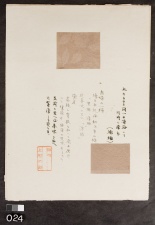Difference between revisions of "Akane + Shikon - top (24 T)"
Jump to navigation
Jump to search
(username removed) |
|||
| Line 15: | Line 15: | ||
|- | |- | ||
! scope="row"|Fiber type | ! scope="row"|Fiber type | ||
| − | | silk | + | | [[silk]] |
|- | |- | ||
! scope="row"|Color | ! scope="row"|Color | ||
| Line 24: | Line 24: | ||
|- | |- | ||
! scope="row"|Dye (English common name) | ! scope="row"|Dye (English common name) | ||
| − | | Madder | + | | [[Madder]] and [[Gromwell]] |
|- | |- | ||
! scope="row"|Dyestuff (botanical name) | ! scope="row"|Dyestuff (botanical name) | ||
Revision as of 18:24, 17 June 2020
| Museum number | 24 |
|---|---|
| Uemura number / title | ; "Haze-some 25" |
| Folder location | 1st shelf |
| Sample location | top (24 T) |
| Fiber type | Silk |
| Color | beige (slightly reddish purple) |
| Dyestuff (Japanese common name) | 茜根 + 紫根: Akane + Shikon |
| Dye (English common name) | Madder and Gromwell |
| Dyestuff (botanical name) | Rubia argyi (H.Lv. Et Vaniot) H.Hara ex Lauener (R. akane Nakai); and Lithospermum erythrorhizon Siebold et Zucc. (L. officinale L. subsp. erythrorhizon (Siebold et Zucc.) Hand.-Mazz.) |
| Plant part | m: root /dried (?); g: root /dried (?) |
| Dyestuff extraction | unspecified |
| Auxiliary agent in dye bath | - |
| Mordant | ash water |
| Other auxiliary agent | - |
| Dyeing process | The fabric was soaked into a dye bath of madder, mixed with Shikon root, and subsequently mordanted with ash water. |
| Uemura's notes | A dyeing technique with madder is described in the "Shoku Nihongi ()" (1177 AD) as " (Kuroki-hi), (Asaki-hi)". The same color is named as " (Kokihi)" in the "Engishiki ()" (10th Century AD). |
| Uemura's date | Kyoto |
